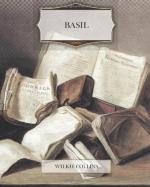My dear husband, I am afraid this letter is very badly written; but the tears are in my eyes, thinking of Susan; and I feel so wearied and flurried after what has happened. We are to go off very early to-morrow morning in a carriage, which is to be put on the railway. Only think of my riding home in a fine carriage, with gentlefolks!—how surprised Willie, and Nancy, and the other children will be! I shall get to Treen almost as soon as my letter; but I thought I would write, so that you might have the good news, the first moment it could get to you, to tell the poor young gentleman. I’m sure it must make him better, only to hear that his brother and sister are coming to fetch him home.
I can’t write any more, dear William, I’m so very tired; except that I long to see you and the little ones again; and that I am,
Your loving and
dutiful wife,
MARY PENHALE.
LETTER III.
TO MR. JOHN BERNARD, FROM THE WRITER OF THE FORE-GOING AUTOBIOGRAPHY.
[This letter is nearly nine years later in date than the letters which precede it.]
Lanreath Cottage, Breconshire.
MY DEAR FRIEND,
I find, by your last letter, that you doubt whether I still remember the circumstances under which I made a certain promise to you, more than eight years ago. You are mistaken: not one of those circumstances has escaped my memory. To satisfy you of this, I will now recapitulate them. You will own, I think, that I have forgotten nothing.
After my removal from Cornwall (shall I ever forget the first sight of Clara and Ralph at my bedside!), when the nervous malady from which I suffered so long, had yielded to the affectionate devotion of my family—aided by the untiring exercise of your skill—one of my first anxieties was to show that I could gratefully appreciate your exertions for my good, by reposing the same confidence in you, which I should place in my nearest and dearest relatives. From the time when we first met at the hospital, your services were devoted to me, through much misery of mind and body, with the delicacy and the self-denial of a true friend. I felt that it was only your due that you should know by what trials I had been reduced to the situation in which you found me, when you accompanied my brother and sister to Cornwall—I felt this; and placed in your hands, for your own private perusal, the narrative which I had written of my error and of its terrible consequences. To tell you all that had happened to me, with my own lips, was more than I could do then—and even after this lapse of years, would be more than I could do now.




